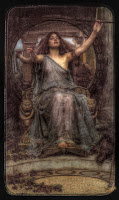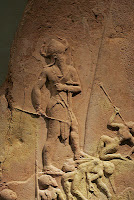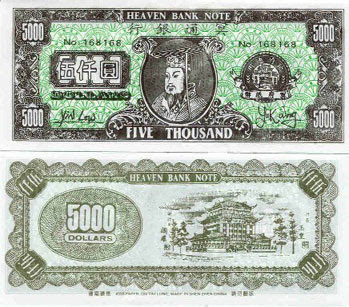Take me back! Set controls for the Iron Age.
I am no fan of the fifteenth, or fourteenth, or even the first century AD.
I got caught up in the story of John Dee and his obsidian mirror and the language known as Enochian because of the subject of magic. It is hard to actually pin down what people mean by magic, it always opens up more questions in my mind.
I don't get satisfactory answers.
The reason why magic is a part of this story is that very often the places linked to Persephone have also been linked to oracles.
The Nekromanteion were oracles of the dead.
Places of necromancy.
Oracles, places where the barrier between this world and another are thin and enable communication with the other-side....were regarded as dangerous. The act of divining the future is still, even today considered a risky business if you ask hard-core Christians.
God in the post-reformation version of Christianity, is not to be questioned or bargained with. Angels no longer speak to man (though I have seen two, newly opened shops recently dedicated to angels).
 The fear of witchcraft seems to me to be more a barometer of cultural anxiety, than a measure of civilization. But generally the concept of witchcraft as a threat to civilised and ordered society goes back most clearly to the Romans. Both the Nekromanteion of Acheron and the sanctuary of Baia, near Naples were destroyed by the Romans as part of a law enforcing the prevention of necromancy.
The fear of witchcraft seems to me to be more a barometer of cultural anxiety, than a measure of civilization. But generally the concept of witchcraft as a threat to civilised and ordered society goes back most clearly to the Romans. Both the Nekromanteion of Acheron and the sanctuary of Baia, near Naples were destroyed by the Romans as part of a law enforcing the prevention of necromancy.
Almost always at oracles we have a shrine to Apollo, and a cave leading to underground tunnels belonging to the Sybil; or we have a 'Sanctuary of Hades' and a 'Palace of Persephone'.
I find it curious that the dead were expected to know anything at all after drinking from the waters of Lethe, but Homer and latter Virgil both describe the approved method of reanimating the spirits to tell of what fate has in store for them.
Perhaps it is because fate (in Sumerian myth, Namtar) is a talkative chap and so the dead would hear whose time was up? In Greek thought, Death was the invitation rather than the process. Fate was the cause for the soul to leave the body, and Fate decided when one's time was up. This meant that Death could be delayed or tricked, but Fate always had your number.
Apollo is linked to divination: at Delphi, at Clarus, at Didyma and more. Apollo sees all because (as it tells us so often in Mesopotamian poems and myth) the sun sees all. At night the sun goes into the Underworld. Apollo Aplu Enlil (Akkadian: son of Enlil) becomes Ne-uru-gal (lord of the great city) where his consort is the queen of the great land...Well, in Akkadian myth..
Mesopotamian myth informs Greek myth and even the concept at the heart of Enochian magick has its roots in the Enuma Elish via The Key of Solomon' (a 14th or 15th century Italian work?). The parallels are too great to dismiss, I think. There may be no similarity between a Mesopotamian ritual to be performed at the time of the moon's eclipse and the way a contemporary astrologer describes the effect of the moon turning red on our lives, but new books are still being written that clearly use concepts -astrology- derived from the first civilisations. I am amazed at how stable belief systems are. The narratives explaining the core information changes considerably, but the core remains...it may be more like a cargo cult version, but a cargo cult version of something that was in itself as equally full of misunderstandings, can't be a bad thing can it?
I see continuity, I may be wrong, but surely the fact speak for themselves?
It is unfortunate that if the Phoenicians really did carve axes on a stone at Stonehenge, that they did not teach people how to write on something that would last for the requisite thousands of years between then and now! We have what the Romans say, we have snippets from Greek speaking travellers and second-hand accounts from ancient historians who have read books that were lost centuries ago....
Ah well...I'll just have to go see what I can find!
I got caught up in the story of John Dee and his obsidian mirror and the language known as Enochian because of the subject of magic. It is hard to actually pin down what people mean by magic, it always opens up more questions in my mind.
I don't get satisfactory answers.
The reason why magic is a part of this story is that very often the places linked to Persephone have also been linked to oracles.
The Nekromanteion were oracles of the dead.
Places of necromancy.
Oracles, places where the barrier between this world and another are thin and enable communication with the other-side....were regarded as dangerous. The act of divining the future is still, even today considered a risky business if you ask hard-core Christians.
God in the post-reformation version of Christianity, is not to be questioned or bargained with. Angels no longer speak to man (though I have seen two, newly opened shops recently dedicated to angels).
 The fear of witchcraft seems to me to be more a barometer of cultural anxiety, than a measure of civilization. But generally the concept of witchcraft as a threat to civilised and ordered society goes back most clearly to the Romans. Both the Nekromanteion of Acheron and the sanctuary of Baia, near Naples were destroyed by the Romans as part of a law enforcing the prevention of necromancy.
The fear of witchcraft seems to me to be more a barometer of cultural anxiety, than a measure of civilization. But generally the concept of witchcraft as a threat to civilised and ordered society goes back most clearly to the Romans. Both the Nekromanteion of Acheron and the sanctuary of Baia, near Naples were destroyed by the Romans as part of a law enforcing the prevention of necromancy.Almost always at oracles we have a shrine to Apollo, and a cave leading to underground tunnels belonging to the Sybil; or we have a 'Sanctuary of Hades' and a 'Palace of Persephone'.
I find it curious that the dead were expected to know anything at all after drinking from the waters of Lethe, but Homer and latter Virgil both describe the approved method of reanimating the spirits to tell of what fate has in store for them.
Perhaps it is because fate (in Sumerian myth, Namtar) is a talkative chap and so the dead would hear whose time was up? In Greek thought, Death was the invitation rather than the process. Fate was the cause for the soul to leave the body, and Fate decided when one's time was up. This meant that Death could be delayed or tricked, but Fate always had your number.
Apollo is linked to divination: at Delphi, at Clarus, at Didyma and more. Apollo sees all because (as it tells us so often in Mesopotamian poems and myth) the sun sees all. At night the sun goes into the Underworld. Apollo Aplu Enlil (Akkadian: son of Enlil) becomes Ne-uru-gal (lord of the great city) where his consort is the queen of the great land...Well, in Akkadian myth..
Mesopotamian myth informs Greek myth and even the concept at the heart of Enochian magick has its roots in the Enuma Elish via The Key of Solomon' (a 14th or 15th century Italian work?). The parallels are too great to dismiss, I think. There may be no similarity between a Mesopotamian ritual to be performed at the time of the moon's eclipse and the way a contemporary astrologer describes the effect of the moon turning red on our lives, but new books are still being written that clearly use concepts -astrology- derived from the first civilisations. I am amazed at how stable belief systems are. The narratives explaining the core information changes considerably, but the core remains...it may be more like a cargo cult version, but a cargo cult version of something that was in itself as equally full of misunderstandings, can't be a bad thing can it?
I see continuity, I may be wrong, but surely the fact speak for themselves?
It is unfortunate that if the Phoenicians really did carve axes on a stone at Stonehenge, that they did not teach people how to write on something that would last for the requisite thousands of years between then and now! We have what the Romans say, we have snippets from Greek speaking travellers and second-hand accounts from ancient historians who have read books that were lost centuries ago....
Ah well...I'll just have to go see what I can find!

